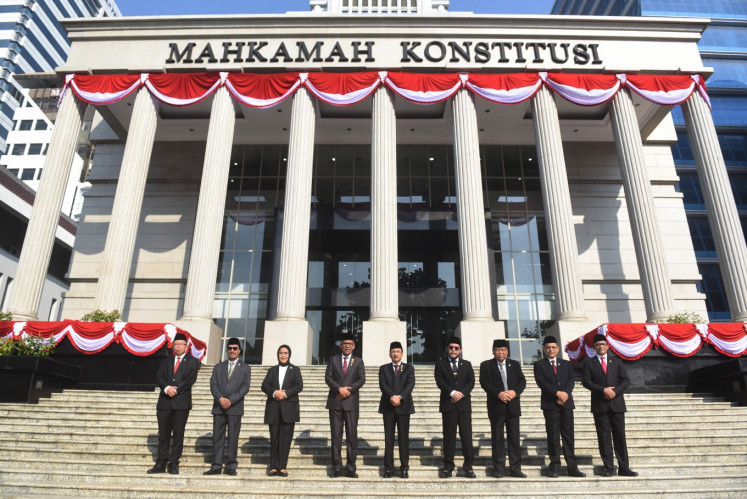Popular Reads
Top Results
Can't find what you're looking for?
View all search resultsPopular Reads
Top Results
Can't find what you're looking for?
View all search resultsIdul Fitri and spiritual renewal
Idul Fitri is only days away, when Muslims across the globe will soon mark the end of the Ramadan fasting month — an annual ritual when Muslims are required not only to refrain from food, drink and sex from sunrise till sunset, but also expected to renew their spiritual commitments
Change text size
Gift Premium Articles
to Anyone

I
dul Fitri is only days away, when Muslims across the globe will soon mark the end of the Ramadan fasting month — an annual ritual when Muslims are required not only to refrain from food, drink and sex from sunrise till sunset, but also expected to renew their spiritual commitments.
The Idul Fitri celebration, locally known as Lebaran, is believed to broaden Islamic piety after the spiritual sacrifices willfully made during Ramadan.
As a joyous occasion, the Idul Fitri celebrations should be considered a stepping stone of spiritual renewal concentrated on “down-to-earth” behavior. Basically, the post-Ramadan behavioral shift is supposed to be celebrated as a restoration of humanitarian values.
The pragmatic attitude is central to the Idul Fitri festival, with a focus on the unity of mankind, universal brotherhood and an absence of distinction between rich and poor.
Anyone capable of embodying these thoughts and feelings are capable of contributing to spiritual renewal.
Spiritual renewal is demonstrated by the following behavioral shifts:
First, the Idul Fitri celebration requires Muslims to practice moderation. Indonesian Muslims must show modesty by remembering their religious values when celebrating victory over desire and temptation.
Disregard for modesty is often displayed by people spending beyond their own means while using Idul Fitri as a reason to be wastefully extravagant (israf).
Muslims must practice restraint by thinking rationally and moderately and by living a humble life under the direction of Islam.
Unpaid electricity and water bills totaling millions of rupiah are one example of squander in Indonesia. Other forms of waste occur in businesses and daily life, including excessive use of food and water, clothing, fuel and bank credit amid widespread poverty across Indonesia.
Children asking for money during Idul Fitri is another example contrary to moderate values. Parents should not allow their children to visit other people’s houses solely on the expectation of receiving money.
Idul Fitri visitations are a time to deepen the bonds of family and friendship. Going to someone’s house with the expectation of leaving with cash defeats the noble spirit of temperance.
Second, Idul Fitri provides the opportunity to advance Islamic solidarity, which is clearly seen in the traditions of mudik (heading home) and the open houses held during Lebaran.
For Indonesian Muslims, mudik is a process of reinforcing and strengthening family ties. No matter how tiring it may be, returning to your “roots” for Idul Fitri is part of Indonesian Muslim culture. Our society loves to visit relatives and friends, and prefers to meet with them personally rather than simply wishing them well over the telephone or via email or text messaging.
Severe traffic congestion, dangerous road hazards and high costs incurred while traveling do not stop Indonesian Muslims from undertaking the journey home to revisit cherished memories.
Open house celebrations serve the dual purpose of celebrating Idul Fitri and renewing social bonds with friends and relatives.
During Idul Fitri celebrations, families and individuals engage in the popular Indonesian Muslim practice of opening their homes to relatives, friends and colleagues.
In the spirit of giving and sharing, the open house tradition should please our friends and relatives, but should not overlook those who are less fortunate.
Third, Idul Fitri should encourage self-reliance in the daily lives of Indonesia’s Muslims. Particularly
in Jakarta, everybody knows that Idul Fitri is an awkward time for wealthy people after their maids and domestic helpers have gone home to celebrate with their own families.
More people are depending upon temporary domestic helpers for Idul Fitri despite the limited labor supply.
A friend of mine working for an employment agency in Jakarta said that customers were in “desperate demand” for temporary domestic helpers. There is a limited supply and some of the workers did not want to commit to new assignments because of low pay and unsatisfactory treatment, he said.
In Indonesia, the normal definition of domestic help is assisting with cooking, household chores
and taking care of children.
Some households also demand that they take care of elderly family members and family members with special needs.
Idul Fitri should be a time for family members to be accustomed to making due without domestic workers. Just look at Western countries — how many households have maids?
Let us celebrate Idul Fitri in its true spirit, as it is meant to be celebrated. To all of you, I wish a blessed Idul Fitri. Eid Mubarak!
The writer is a lecturer at Andalas University, Padang and a graduate of the University of Canberra,
Australia.









